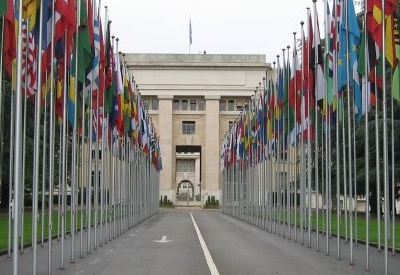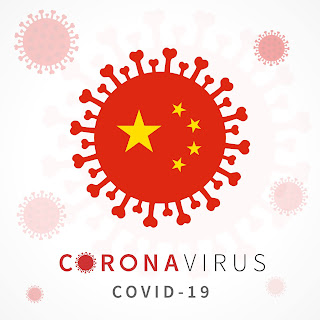a bi polar world re-emerges with Russian attack on Ukraine
The Soviet union and America could not reconcile trade issues because their political systems were too diverse. Treaties signed between the Soviet Union and the U.S. failed to sway Soviet foreign policy or satisfy American officials. Indeed, the 'Reagan Doctrine' imposed during the 1980s provided covert funding to Marxist influenced governments to constrain their influence. Reagan had the benefit of a Soviet leadership in decline with the passing of Brezhnev, Andropov, and Chernenko who passed away between 1982 - 1985. This left the Soviet leadership in disarray which they felt to be in good sway for the long term stability of the USSR wth Mikhail Gorbachev's appointment. Ultimately, with Gorbachev's policies of Perestroika (political/economic reform) and Glasnost (openness of public officials and institutions) the Soviet Union collapsed in 1991 and with it the Warsaw Pact. This left a cleavage for former Soviet states to migrate to NATO leading to the current Russia - Ukraine malaise.
Currently, China and America have a trade deficit that is approximately 200 BLN USD for the first six months of 2022. The U.S. has imported 43 BLN more in goods from China this year compared to 2021. Clearly, the Trump tariffs are not re-balancing the intercontinental trade between the two global powers. Much as the Clinton Administration supported China's entry into the WTO to compel China to democratise, the influence by American officials failed wth China as with the FSU (Former Soviet Union.) Despite the political differences separating Russia and the U.S. now and then, and the current Taiwan dilemma; using financial incentives to adopt democratic foreign policy has proven ineffective and a waste of economic resources. Yet, the cost to provide aid to the developing world is paramount with China attempting to spread its influence through its signature 'Belt and Road Initiative.' China has become adept at "grey zone" economic policy (BRI) and military policy ( Taiwan, Tibet, and the Indo Pacific,) that is expanding defense budgets internationally. However, to counter a belligerent China's rise, governments can tweak their domestic policy approach to China such as eliminating Confuscious Institutes, promoting domestic students over international students for placement at colleges and universities, while expanding R&D to foster domestic industry such as rare earth metals.
To summarise, authoritarian regimes foster a cult of personalty through their appointed leadership or due to a military coup in order to grasp and sustain a hold on the levers of governance. While corruption is evident in every political sphere, authoritarian leaders use their position to amass great fortunes at the expense of their subjects. Xi Jinping of China has an estimable value of 1.2 billion. Some say that Vladimir Putin of Russia is worth approximately 70 billion. Kim Jong - un (North Korea) has an approximate value of 5 billion. It is understandable why authoritarian states have little regard for democratic reforms that threaten their bottom line. Xi took office in 2012 with the goal of reducing the graft and corruption. No doubt, it seems prima facie good politics as a new leader to foster support from within political corridors and among citizens, and prima facie good business sense to consolidate wealth, while in power.
China, Russia, North Korea, and Iran are forging closer economic ties to create a cleavage in the East versus western powers in a reenactment of Cold War ideology. Russia's attempt at annexing Ukraine, while appearing futile, has entrenched this divide with the west supplying Ukraine with armaments to defend itself. American sanctions have stymied the economies of all the aforementioned states because of their military provocations, though, China is surreptitiously or not so blatantly, galvanising its place as the number two global economic power. Hence, the Trump era tariffs to attempt to balance the Sino - U.S. trade deficit.
Russia's adventurism in Europe has shocked its neighbours and led to Sweden and Finland applying for NATO membership. This event will further isolate Russia in Eastern Europe and among G7/G20 and global leaders that support human rights and freedom of speech, which has collapsed during Putin's time in office, is minuscule in Xi's China, particularly since Hong Kong adopted security law in 2020, and the PRC's continued harassment of Taiwan through international channels and its air force threatening Taiwan inside its ADIZ (air defense identification zone) and the continued extermination of Tibetan culture on the Tibetan Plateau. For NATO to gain a beachhead in the Indo Pacific would serve democracies best interests. Taiwan supplies the perfect base for a Pacific NATO.
Russia has failed in adopting the sanctity of war with Ukraine - jus in bello (law in war) has seen the Russian military guilty of numerous war crimes and atrocities, while, jus ad bellum (conditions of war) was a clear violation of Ukraine's territorial integrity dating to Russia annexing Crimea in 2014. Jus post bellum (rebuilding the captured territory) will rest with Russia only if they are successful in conquering Ukraine. But, as usual, democracies will have to foot most of the bill when the aggressors are ousted. Russia, as perpetrator, need to be held accountable as Germany was when faced with the Treaty of Versailles regarding reparations concerningWW1. Ultimately, the international community has a prima facie obligation to assist Ukraine based on need and association versus nuclear risk and human casualties inherent in war.





